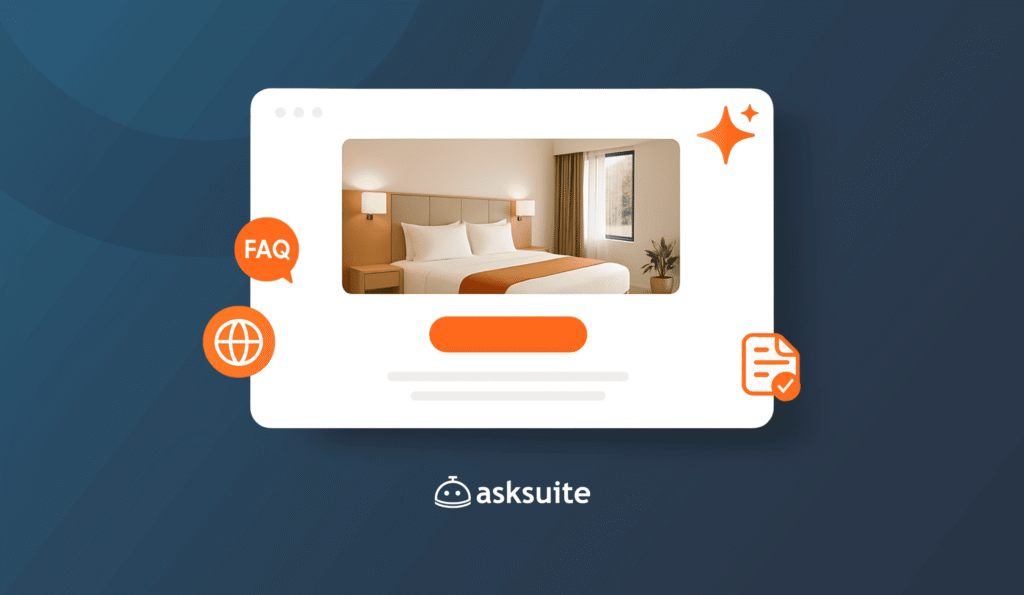How can you provide the best customer service in hotels during pre-stay?
Let’s imagine travelers trying to decide where to stay on their next trip. I’m pretty sure they’ll do some research from their mobile or desktop, check out hotels’ social media, and from the information they gathered, they’ll try to connect with their hotel of choice.
Where they’re staying is an important factor that impacts the entire travel experience, so they can’t afford to make a bad choice. But, as much as they want to gather information, at the same time, they probably don’t have much time to spend doing research.
They want to start dreaming about traveling.
As you can see, your hotel customer service is crucial to converting these online visitors into guests. Many articles talk about the customer service during stay, but what about the assistance provided before booking?
It’s at this moment you want to be there for your target audience and provide spotless and efficient customer service, so they choose you over your competitors.
Keep in mind that the consumers’ expectations of service are changing. You are expected to delight at every customer touchpoint, including before their stays.
Here is where two challenges arise for you, hotelier:
- You need to provide travelers with important information, so they can make educated decisions about where to stay.
- You need to be fast in providing them with what they’re looking for before booking, after all, it’s so easy to book at another hotel.
Customer service is the heart of the hospitality industry. But it became a greater challenge with the multiple channels customers now have to contact a hotel.
In this article, we explain:
- How to provide excellent customer service in the hospitality industry.
- 9 ways to provide excellent customer service during the pre-booking process with valuable and practical tips you can apply now to improve your service during the travelers’ decision-making process.
How do you provide excellent customer service in the hospitality industry to increase your reservation & sales team’s performance?
Here at Asksuite, many of our clients have witnessed significant growth in direct bookings and qualified leads (groups and events) by providing outstanding customer service. That happened among all sorts of clients: independent hotels, resorts, chains.
The point is that even though there are different hotel sizes, different ways to operate them, and different categories, the truth is today’s travelers have high expectations.
The buyer’s journey has changed. Now, customers do extensive research before committing to a product or service. Sometimes, they might even know better than your sales team when it comes to what your hotel doesn’t have or have in comparison to another hotel, or where they find the best rates – unfortunately, many times it isn’t through direct bookings.
With the additional note that when travelers compare your service, they don’t compare it only with other hotels, but with any kind of business they’ve been in contact with.
Might not be fair, especially for small independent hotels, but that’s how the game is played now. That’s why it’s so important that you elevate your service on all channels.
Ok, so all channels are impossible for you right now? Then focus on the ones your ideal guests prefer. How to choose? Through data. Get to know your customers well before making a strategic move.
And remember that whatever channel you decide to focus on, your customer service must be top-notch. Don’t make the wrong first impression digitally, it does count!
9 ways to provide excellent customer service during the pre-booking process to increase direct bookings and revenue
There are great articles out there talking about customer service during the stay. But they failed to address the customer service provided before potential customers turn into guests. Without perfect customer service at that stage, your chances of getting more reservations decrease significantly.
Keep in mind that every new guest creates expectations around the services of your brand and takes past experiences into consideration.
If you aren’t sure how to start or where you could improve, we listed 9 useful tips to elevate your game and help you convert more reservations.
1. Be available on the main digital channels
We’ve mentioned before that it is important to be available on the main digital channels as travelers tend to contact hotels directly on their channel of choice. This means sending DMs (direct messages) to hotels on social media, for example.
Nothing frustrates a customer more than:
- Sending a message and being asked to call or send an email instead
- Getting in touch by any channel (email, social media, chat) and having to wait for a long time for an answer
If any of these situations happen, the most likely result is that they will give up on you and move on to another hotel.
Here is an important factor that you should have in mind when building or optimizing your customer service. According to our data from 23+ million chats, over 54% of the chats take place outside business hours and weekends are important as any other day:
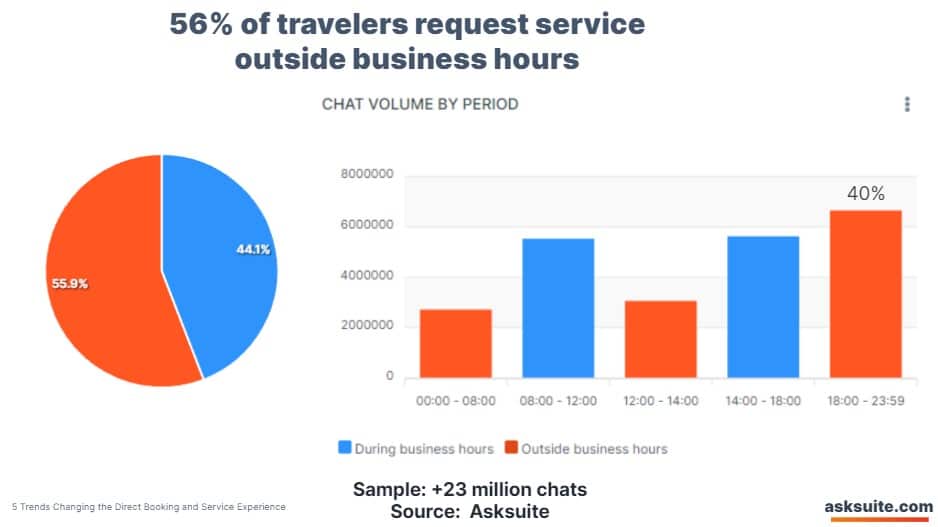
Ignoring the data means losing opportunities to increase revenue. We all know how expensive it is to have a team working 24/7. This is one of the reasons why more businesses are adopting self-service and digital assistance.
Poor customer service costs you money
Most travelers check out your hotel website before booking a room and usually, they have questions about your facilities, payment conditions, rates, and more. Be sure that your website is easy to navigate and that users can find how to contact you.
The ideal scenario is to offer not only relevant content or FAQ on your website but also provide digital assistance so you can grab the online visitor on the spot. There are many tools to help you here, such as a LiveChat or a chatbot, or even both.
One great advantage of adopting automated service in different channels of communication, such as social media, is that the hotel increases the number of chats and interactions and decreases the work overload.
At Asksuite, we’ve analyzed over 1B messages exchanged with travelers, and we’ve recorded more than one thousand different types of questions. It’s impossible to provide all this information on your website, that’s why virtual assistance is so important.
Plus, over 40% of the interactions are about room quotations. The way your team answers them impacts significantly the conversion rate. Providing images and complete answers to each of these requests can take a long time. Find ways to help your team to handle it, while satisfying your potential guests.
If you have a small team, it’s imperative to choose the main channels of communication chosen by your ideal guest and optimize them, instead of “trying to be everywhere”.
Don’t miss out on the opportunity to convert travelers that are clearly interested in staying at your hotel.
The multichannel customer service challenge is not easy to overcome. We ask global hospitality experts Calvin Tilokee, Adele Gutman, Max Starkov, Thais Bandinelli, Claudio Habibe, Christoph Hutter, and Waldin Duran what they would do if they have to prioritize one customer over the other. Read here what they have to say [Customer Service Dilemma].
2. Capture potential guests’ information
Not all people that get in touch with your hotel make a reservation. Many travelers contact you while they are still considering making future trips.
This is a great opportunity for you to get their contact information, learn about their preferences and send them an email, give them a call, and text them to let them know about a future reservation, promotional packages you have, and new special services.
When they reach out to you, they are opening a door to a relationship with you. Don’t waste the opportunity.
A customer may or may not want to commit at this point but if you make it easy to do business with you, they might make a reservation on the spot or later on.
How can a hotel capture lead information?
You can capture this information with or without technology. Here are some ideas:
- You can write down their basic information on a spreadsheet during a phone call.
- Ask them to leave their contact number while assisting them in LiveChat.
- You can have a chatbot in place on your website that asks for their information before giving a room quote.
- You can use pop-ups and forms on your website
One important note: Be sure to ALWAYS get clients’ consent before capturing their information as guided by GDPR (General Data Protection Regulation). Everyone responsible for using personal data has to follow strict rules called ‘data protection principles’.
Here you can see how it is shown in our AI booking assistant:

What to do next?
Then, your team can elaborate a strategy to contact those potential guests coming from different channels and create an email, WhatsApp, or SMS campaign according to the preferences you discovered while providing customer service.
This way, they will get relevant offers, making it hard to say no!
Of course, not every traveler that contacts you will turn into a possible customer, but you will definitely have a better chance of increasing direct bookings if your team is prepared to get the best of the customer service provided during the pre-booking process.
Nurture your relationships, get to know your target audience and your business will thrive.
Are you doing a follow-up strategy for hotel booking? They are especially indicated when the guest abandons the cart. Know more about it in our article: [Hotel Follow-Up]
3. Train your team
Phone, email, social media, chat. Whatever channel your reservation team is working with, it is crucial that they are well-trained.
It’s imperative that your property implements hotel customer training so your team learns ways to improve their customer service skills. In one episode of our Hotel Cast Podcast, we chatted with Consultant Jutta Moore about the skills that are required to work in Reservation and Sales. Here is what she said:
“ At reservations, you have to be absolutely super flexible, have great interpersonal skills, and most of all, you have to be hospitable. Because we are all about hosting, making customers feel good, and delivering that welcoming experience.
Your phone voice and mannerisms are so very important. The listening skill it’s really important in Reservations because guests are so much more anxious now.
They want to know what’s happening at the property, what covid measures you have in place, how secure it is, and so on. You really need to be able to listen to the customers to see what they need.
In sales, you need to be a bit more competitive to actually fight for the business, and to be more creative as well so you can create any kind of special offer. You can be a little bit more competitive and a little bit more efficient as well.”
She also stressed the importance of getting back to potential customers quickly, being reliable, and delivering what you said you would be delivering.
You can listen to the entire podcast episode with Jutta here: [Hotel Sales]
Jutta pointed out that agents so often spend so much time with a customer you give them all the information. Hotel agents tell them everything they want to know but they don’t ask for the business at the end. Which can be as simple as saying: “Can I make this reservation for you?” before you hang up the phone.
In fact, in our recent survey with over 120 hotels around the world, over 50% of respondents said the average handle time of phone calls is 4-8 minutes. Around 40% of the hotels stated that the average number of phone calls they get in a day is 30 calls.
There are many opportunities to sell more through phone calls!
Regarding emails, when answering one, instead of writing: “Sorry, we don’t have any more available rooms.”, why don’t you offer alternative dates? More often than not, travelers might be interested in staying at your hotel for at least a few days on their next trip.
Whatever your customer is asking for that you can’t provide, don’t say a simple NO. Give them an option, a solution, so they have a reason to stay.
Train your staff in different channels, since each of them requires different abilities and skills.
If you want more tips about Sales & Reservations, Doug Kennedy, President of the Kennedy Training Network, Inc, shared his insights in this episode of Hotel Cast Tv. He explained the new strategies the industry needs to embrace to generate more bookings and revenue. It’s free: [Watch the Replay]
4. Combine human agents and technology
Another great way to provide excellent customer service is by combining human resources and technology.
The number of requests coming from different sources can be overwhelming to any hotelier. Especially when the industry is facing a serious labor shortage, finding it difficult to hire talent.
Since we are still not able to divide ourselves into two or three people, the best solution is to analyze your hotel tech and find solutions that can help you in customer service.
Let’s be clear: technology is not here to replace humans. Instead, technologies were built to provide better conditions for hotel staff to perform with excellence.
Technology empowers humans.
What is the most scarce resource? Time! Consequently, hoteliers must use their time wisely: there is no turning back time!
Simple and repetitive activities don’t bring value to tasks performed by a human agent.
Advantages of the use of automation
Automating these activities can bring advantages both to clients and hotels. Including financial ones.
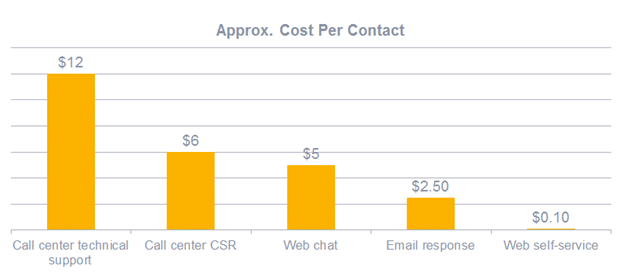
Answering 24/7, on the main messaging channels, a hotel chatbot allows human agents to prioritize more complex activities than answering 20 times the same question.
With the right technology, hotels gain productivity, efficiency, and control. Technologies can help organize guest data, improve customer service and scale your service.
If a chatbot frees your staff’s time by answering repetitive questions from different channels, they’ll have time to provide a refined customer experience. And you know that even for customers booking with OTAs, if they enjoy the service, they’ll come back booking directly, freeing you from huge OTA commissions.
In addition, when it comes to multiple customer service channels, there are omnichannel platforms, like Asksuite, that enable you to control your customer service quality and manage multiple demands.
Not to mention the opportunity for great teamwork between humans and machines, since human intervention is possible at any time in any conversation the bot is having.
If you’re hesitating to adopt technology in customer service, take a look at these numbers provided by Business Insider:
- 45% of consumers don’t care if they interact with a human agent or chatbot (as long as the service is efficient);
- 49% of consumers use automated channels, without any human interaction, at least once a week. Between Millennials, this number goes up to 66%.
What is best? Chatbot or human?
From our talk with more than 1,000 hotels, we’ve learned that there is no “one size fits all” solution. It all depends on your operations. You can:
- Set the chatbot available 24/7 without human interventions. Your team can check the message once a day and follow up on specific conversations.
- Have a live chat with humans during business hours and activate the chatbot outside business hours.
- Have someone in your team assessed to follow all conversations and interact with travelers when they think it’s necessary
Regardless of the model that you choose, investing in the partnership between humans and machines increases customer satisfaction, and maximizes hotel revenue.
5. Be fast and efficient
Time is money. Or in this case, time is booking. If your potential guest has to wait for your answer, chances are they will try to contact another hotel instead. After all, who has time to wait?
Answering travelers quickly and efficiently is essential to increasing direct bookings, but many hotels are still overlooking this important aspect. Take a look at the guests’ expectations regarding response times by Alice:
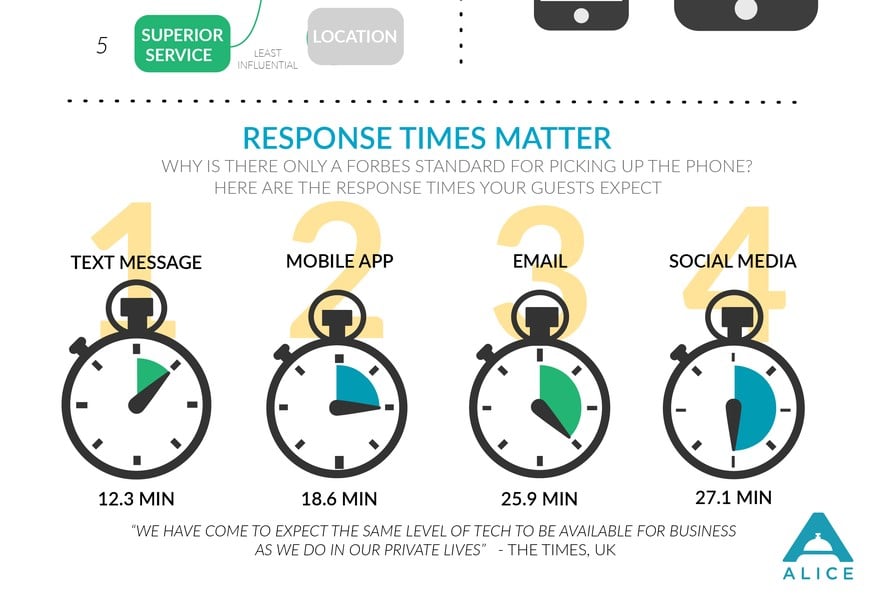
These are high expectations to meet. But there are tools that can help you and your team to provide excellent customer service.
You can create email templates to answer faster, especially since many emails are very similar. There are even technologies that autofill your answers by text or email, which decreases your time response.
You can also have an omnichannel platform that unifies your customer service on one screen. Using this tech, you will be able to follow the different requests easier and faster, without the need to change tabs on your computer all the time to check for a new message.
You work smarter and your customers get assistance faster. They won’t even have time to check out another hotel.
Exper Tip
It can happen that your team won’t be able to answer all the phone calls, emails, and texts in one day. From talking with our clients, we’ve learned that a good practice to adopt is to start the day by answering everything that is pending.
6. Set a pattern
Standardization in service is a fundamental strategy to attract and retain travelers. It provides a sense of professionalism and it’s the best way to guarantee the quality of your service in every channel.
When we analyze hotel service, unfortunately, we often find fragmentation and carelessness in support. Many hotels don’t even have a playbook or any kind of guidelines to give their associates in customer service so they know the dos and don’ts.
The result? Confused and frustrated customers get different experiences not only in different channels but even in the same one, depending on which agent they will talk to.
The way your employees communicate with guests and how they guide the conversations have a major impact on your hotel service.
Standardization will diminish errors and optimize the quality of your service.
Good hotel training is imperative to fix the problem.
And remember that you can also rely on technology to make your job (and your associates’ job) easier and standardized. If you use a chatbot, for example, it’ll never answer incorrectly or say something that is not aligned with your brand.
7. Segment customers and assign the right agent
There are many types of customer service requests:
- Information
- Events
- Group packages
- Room quotes
- Other
Each property has teams of different sizes. In fact, in our survey in 2022 with more than 120 hotels, we found out that nearly 57% of the hotels operate smaller teams in call centers (up to 3 people), while 24% have over 10 team members. That’s a big difference!
However, even if you work with a smaller team, we recommend that you segment your team into two different groups at least. Your hotel can benefit from having some kind of filtering process, such as an IVR system for phone calls and other types of filters in different channels. This way, you can automatically direct the specif demands to specif agents.
Make sure you assign the best team member to assist in that particular request. Many hotels divide their teams into three:
- Reservations
- Events
- Group packages
Each group requires a different approach and different skills from your teams. Groups usually request negotiation about prices and rooms to allocate them; a company that is looking for a place to host an event needs specific information about infrastructure; a family trying to book a hotel room asks about hotel facilities, and so on.
Assigning your best agent to a specific demand will provide a better service and increase the chances of sealing the deal. Better prepared staff means more satisfied customers and more revenue.
This is one of the best practices that we uncover in our 2022 survey with over 120 hotels. The majority (60%) of the respondents said that they divide their teams based on the type of demand.
A platform integrated with an AI chatbot, like the one Asksuite provides, can do this for you.
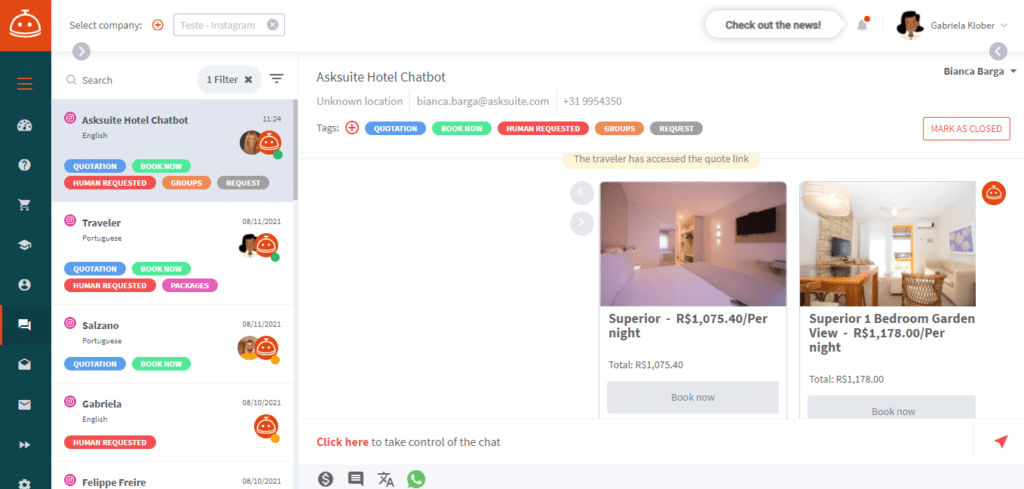
The tags that you can add in each chat help you keep track of what kind of assistance customers are requesting, making it easier to assign the right human agent.
We recommend that you segment your team in each of the following demands/teams:
Reservations/Sales:
They should be focused on providing assistance to those travelers who haven’t booked with you yet. They can answer the demands of groups and events, for example. This team should act as a seller, and their persuasion skills should be a must-have skill to be identified during the recruitment process.
This team can also be in charge of upselling, such as room upgrades, or cross-selling different experiences the hotel has to offer before the guest arrives at the hotel. They can send automated messages to them and reply to those who are interested in the offers.
Working with different sectors inside of Reservations requires some kind of triage when customers get in touch with you. Be sure to train your team, so this process runs smoothly and doesn’t turn into customers’ frustration.
Front Desk:
The team should focus on providing assistance to those who have already booked a room and want to clarify any doubts. They also provide assistance to guests at the hotel. The agent should be someone who wants to help people, extremely polite and hospitable.
Even though they are not directly responsible for Sales, the front desk team should also be aware of what the hotel has to offer when interacting with guests, seizing the upsell and cross-sell opportunities that might arise.
Expert Tip: Segment per channel
Some of Asksuite’s clients have attested that when you segment your team into different channels, this can also increase the conversion rate. Depending on the hotel’s demand for customer service, it might make sense to have one or two agents focused only on answering phone calls. This channel requires some specific skills, such as a good tone of voice, the ability to speak different languages, and more.
On the other hand, in many countries, WhatsApp and social media are important sales channels. In these cases, it makes sense to have a different agent assigned for this type of channel, as it requires a different set of skills from phone calls.
8. Get an omnichannel platform
One of the biggest challenges Reservations face today is to understand the journey of the interactions made by the traveler through different channels.
If I send an email today, a WhatsApp message tomorrow and a DM on Instagram the next week, the hotel will consider them as three different interactions from different people. Without a system that unifies the interactions, it’s impossible for the agent to know that the person that sent the message is the same one that sent an email before.
That’s why an omnichannel platform is crucial for customer experience. The team is able to see all the interactions from one customer in one single chat. This simplifies and optimizes significantly sales process.
In the image below, you can see how every conversation can be seen and managed within the Asksuite dashboard. The chats represent each customer.
When you see the tag IN, it means that the person interacted through Instagram. When you see Asksuite’s logo, it means that the interaction was through website chat. When you see both, it means that the customer interacted through both channels. Asksuite is also integrated with Facebook, Google Messages, and WhatsApp.
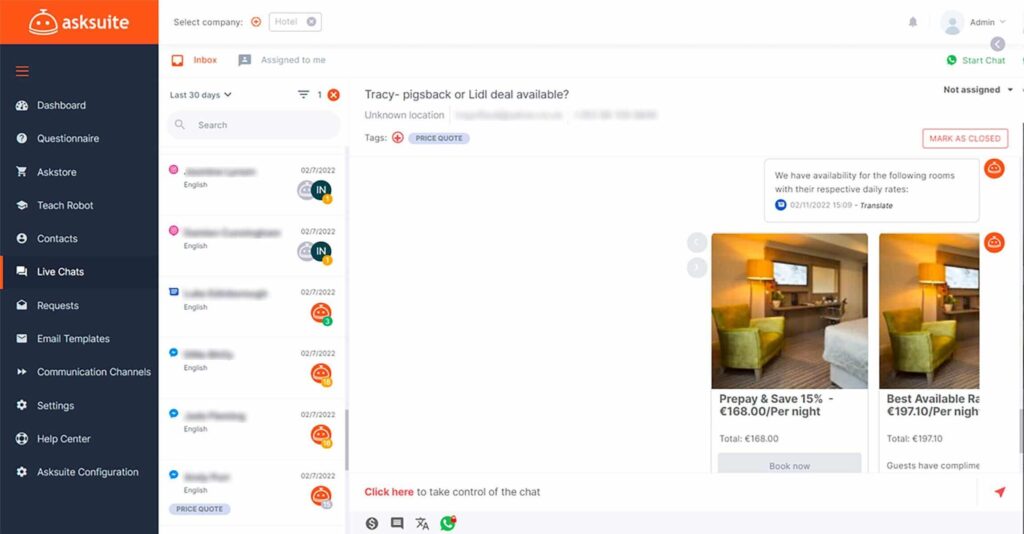
9. Outsource
Finally, if your hotel can’t handle the multiple requests due to a labor shortage, a good option is to outsource your call center or hire a consultant.
Besides, having a pair of fresh eyes can be very beneficial for your operations. They might see clearly how you can improve your hotel customer skills, by providing outsourced staff, tools, and strategies.
Do you have any hotel customer service tips? Share it in the comments! And don’t forget to follow Asksuite on LinkedIn for our latest updates and news.
First publication on 10/13/2021, revision on 03/11/2024.
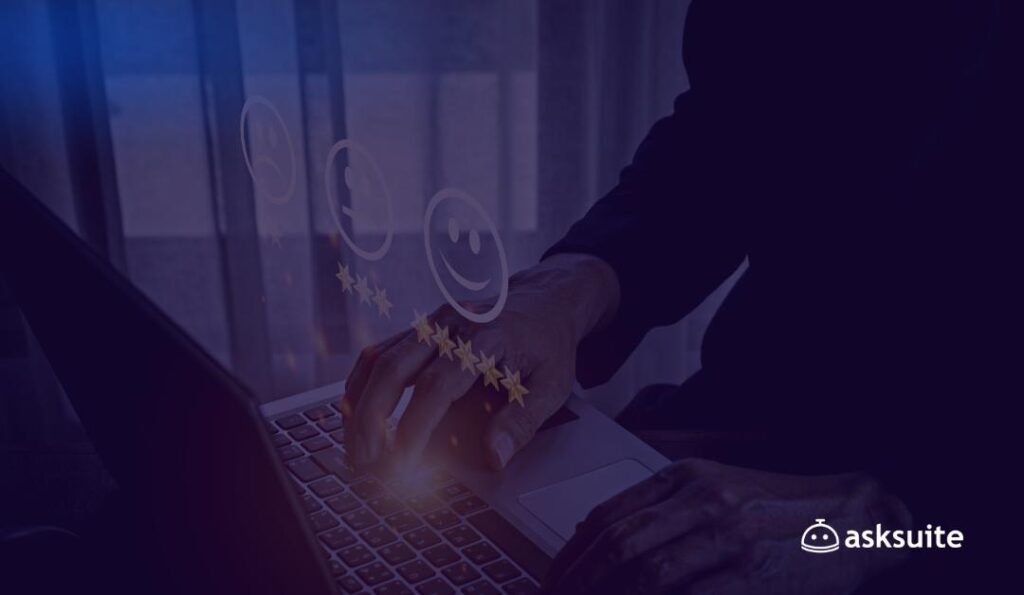

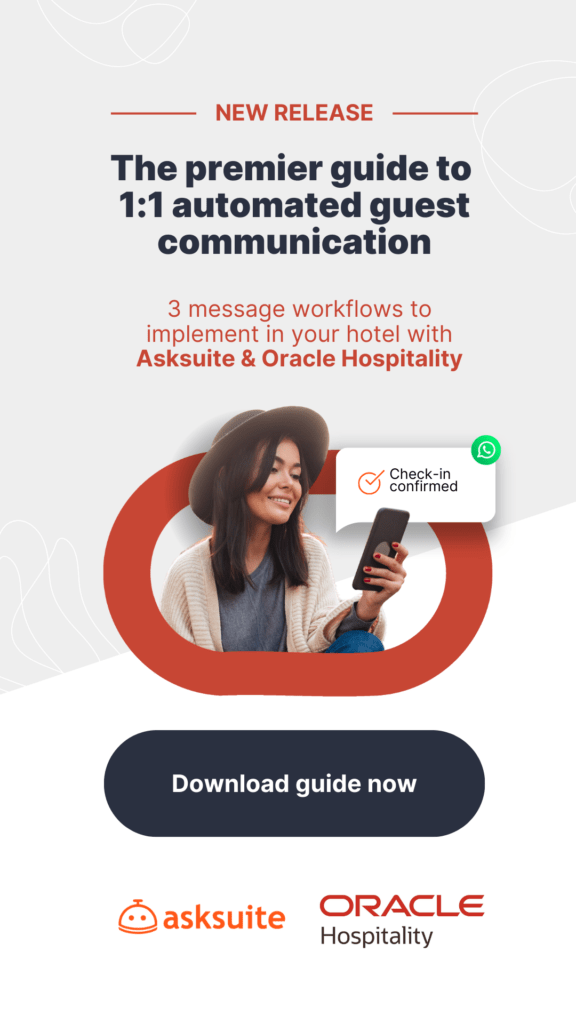

![EN Banner Blogpost Creditos ()[]](https://asksuite.com/wp-content/uploads/2025/11/EN-_Banner_Blogpost___Creditos_21-1024x595.png)
